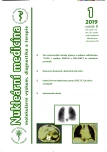-
Medical journals
- Career
Our first experience with the dosimetry of eye lens at the Nuclear Medicine Department of the District Hospital in Příbram, plc.
Authors: Lukáš Fil 1; Zdeněk Zelenka 2; Pavel Hefka 1; Otto Lang 1,3
Authors‘ workplace: Oddělení nukleární medicíny, Oblastní nemocnice Příbram, a. s., ČR 1; NUVIA Dosimetry, s. r. o., Praha 8, ČR 2; Klinika nukleární medicíny, 3. LF UK a FNKV, Praha 10, ČR 3
Published in: NuklMed 2019;8:6-11
Category: Original Article
Overview
Objective: Monitoring of radiation dose of eye lens in accordance with Act No. 263/2016 Sb. and Decree No. 422/2016 Sb.
Method: A calibrated film dosimeter from NUVIA Dosimetry, Ltd., was used to monitor the radiation dose of the eye lens. Eye dose of pharmaceutical technologist was monitored throughout the year 2018. The dosimeters were sent for evaluation once a month. The measured Hp(3) personal dose equivalent which is used for monitoring an equivalent dose of the eye lens was compared with the Hp(10) personal dose equivalent used for a whole body equivalent dose. The existence of correlation was verified by calculating Pearson correlation coefficient.
Result: The annual Hp(3) for pharm technologist FA1 is 1,83 mSv and for FA2 1,34 mSv. The annual value of Hp(10) for FA1 is 2,43 mSv and 1,80 mSv for FA2. The ratio Hp(3)/Hp(10) is equal to 0,71 on average. The Pearson correlation coefficient of personal dose equivalent Hp(3) and Hp(10) equals to ρHp(3), Hp(10) FA1 = 0,41 (p ≈ 0,18) for FA1 and ρHp(3), Hp(10) FA2 = 0,70 (p ≈ 0,01) for FA2.
Conclusion: The results suggest that in the current operation at the Department of Nuclear Medicine in Příbram, it is not expected to exceed the monitoring levels nor the dose limits for category A radiation workers according to Act No. 263/2016 Sb. and Decree 422/2016 Sb. Due to the small number of measurements and monitored
employees, the correlation between Hp(3) and Hp(10) cannot be statistically proven.
Keywords:
radiation protection – eye lens – dosimetry
Sources
- Vyhláška č. 422/2016 Sb. o radiační ochraně a zabezpečení radionuklidového zdroje [online]. 2016 [cit. 2019-01-31]. Dostupné na: https://www.zakonyprolidi.cz/cs/2016-422
- Zákon č. 263/2016 Sb. Atomový zákon [online]. 2016 [cit. 2019-01-31]. Dostupné na: https://www.zakonyprolidi.cz/cs/2016-263
- Zelenka Z, Technické parametry dozimetru, metodika vyhodnocení dozimetru, osobní korespondence
- Bernier MO, Journy N, Villoing D et al. Cataract Risk in a Cohort of U.S. Radiologic Technologists Performing Nuclear Medicine Procedures [online]. Radiology 2017. [cit. 2019-01-31] Dostupné na: doi:10.1148/radiol.2017170683
- Wrzesień M1, Królicki L, Albiniak Ł et al. Is eye lens dosimetry needed in nuclear medicine? [online]. J Radiol Prot. 2018;38 : 763-774. [cit. 2019-01-31] Dostupné na: doi:10.1088/1361-6498/aabef5
- Walsh C, O‘Connor U, O‘Reilly G. Eye dose monitoring of PET/CT workers. [online] Br J Radiol. 2014;87 : 20140373 [cit. 2019-01-31] Dostupné na: doi:10.1259/bjr.20140373
- Sipilä O, Lindholm C, Manninen AL et al. Eye lens doses of staff members in two Finnish nuclear medicine units. [online]. EANM 2018 [cit. 2018-12-30]. Dostupné na: https://posterng.netkey.at/eanm/viewing/index.php?module=viewing_poster&task=&pi=3615&searchkey=&scrollpos=76.80000305175781
- Martí-Climent JM, Moran V, Mota ML et al. Eye lens dose in Positron Emission Tomography staff. [online]. EANM 2018 [cit. 2018-12-30]. Dostupné na: https://posterng.netkey.at/eanm/viewing/index.php?module=viewing_poster&task=&pi=3598
- Dalianis K, Kollias G, Vlachou F et al. Occupational exposure for eye, thyroid and gonads to medical workers operating in a PET/CT facility. [online]. EANM 2018 [cit. 2018-12-30]. Dostupné na: https://posterng.netkey.at/eanm/viewing/index.php?module=viewing_poster&task=viewsection&pi=3619&ti=18796&searchkey=#poster2
Labels
Nuclear medicine Radiodiagnostics Radiotherapy
Article was published inNuclear Medicine

2019 Issue 1-
All articles in this issue
- Effect of instrumental methods in preparing and application of 18F-FDG using KARl100 and RAD-INJECT for staff dosimetry
- Our first experience with the dosimetry of eye lens at the Nuclear Medicine Department of the District Hospital in Příbram, plc.
- Hiatal hernia detected by SPECT/CT on a lung ventilation perfusion scintigraphy
- Nuclear Medicine
- Journal archive
- Current issue
- Online only
- About the journal
Most read in this issue- Hiatal hernia detected by SPECT/CT on a lung ventilation perfusion scintigraphy
- Effect of instrumental methods in preparing and application of 18F-FDG using KARl100 and RAD-INJECT for staff dosimetry
- Our first experience with the dosimetry of eye lens at the Nuclear Medicine Department of the District Hospital in Příbram, plc.
Login#ADS_BOTTOM_SCRIPTS#Forgotten passwordEnter the email address that you registered with. We will send you instructions on how to set a new password.
- Career

